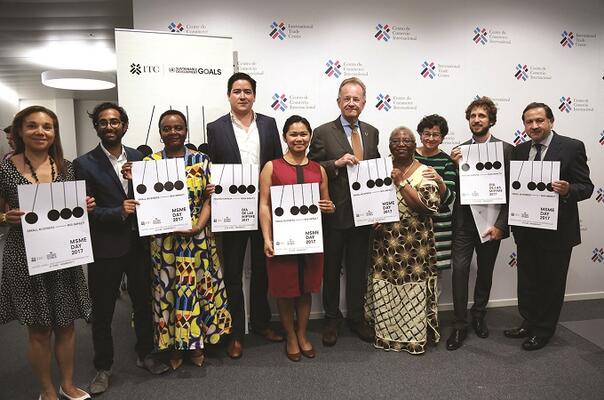
Celebrating the world’s MSMEs (en)
Micro, small and medium-sized enterprises (MSMEs) are the backbone of every economy across the world. They make up over 90% of all firms worldwide and account on average for up to 70% of total employment and half of GDP.
It was in recognition of their position and the important role MSMEs can play in achieving the 2030 Agenda on Sustainable Development that the United Nations General Assembly designated 27 June as International Day for MSMEs.
MSMEs are well placed to respond quickly to societal needs. Because they tend to employ a larger share of vulnerable sectors of the workforce - such as women, youth, the poor and those living in rural areas - they foster inclusion and promote income distribution. By putting policies supportive of MSMEs in place, policymakers can help ensure that more people benefit from greater economic growth.
MSME DAY CELEBRATIONSTo raise awareness of MSMEs and their significant contributions, the International Trade Centre (ITC) led an awareness-raising campaign on behalf of the United Nations family which gathered momentum across the world, especially on social media.
ITC also hosted two events to mark the day. A main celebration held in Geneva in partnership with the Permanent Mission of Chile, the Canton of Geneva and the Geneva Chamber of Commerce and Industry. The other was at United Nations headquarters in New York in partnership with Argentina; the United Nations Department of Economic and Social Affairs; and the United Nations Global Compact.
The Geneva event was opened by ITC Executive Director Arancha González and Héctor Casanueva, Chile’s Permanent Representative to the World Trade Organization (WTO), who cited the need to cut red tape that creates barriers for MSMEs to internationalize.
Several entrepreneurs also made contributions. Catherine Fiankan-Bokonga, editor of Klvin magazine and correspondent for broadcaster France 24, led a session with four young entrepreneurs who set out challenges they face in business, as well as opportunities. They also made the link to business as a tool for poverty eradication.
Cattelaya Romero-Faude, founder of Saganà, a Philippines-based company producing coconut sweetener, emphasized that only a responsible business with a conscience can elevate people out of poverty.
‘Any business should have a positive impact on the environment, on health and should please both producers and consumers,’ Romero-Faude said.
CONNECTING PEOPLEOmar Bawa, co-founder of Swiss social network Goodwall, reminded the audience of the importance of planning for the future when it comes to jobs.
‘Goodwall is about building up the next generation’s employees and workers,’ Bawa said. ‘We are growing with our users and want to help them find their first job, their first meaningful internship.’
Francisco Villalpando Mendiola, cofounder of Villalpando-Mendiola, a tequila producer, pointed to the need for solutions to how MSMEs can better respond to the negative effects of climate change.
‘We recently had snowfall, which caused a spike in agave prices,’ he said. ‘Now we are looking for sustainable alternatives in our industrial production process that will allow us to withstand changes in climate.’
Brian Pallas, chief executive officer and founder of Opportunity Network, pointed out that young people today are less focused on building businesses solely for profit.
‘We want to create jobs. Today, businesses are born for impact,’ Pallas said.
The event also heard remarks from Nicholas Niggli, Director-General, Economic Development, Research and Innovation of the Republic and State of Geneva, Ms. Yvette Stevens, Ambassador and Permanent Representative of Sierra Leone to the UN and the WTO, and Michael Møller, Director-General of the United Nations Office at Geneva.
New York’s MSME Day was marked by a lively high-level discussion led by United Nations Under-Secretary-General Wu Hongbo, who set out on the importance of MSMEs for the business models of multinationals such as Chinese online retailer Alibaba Group.



